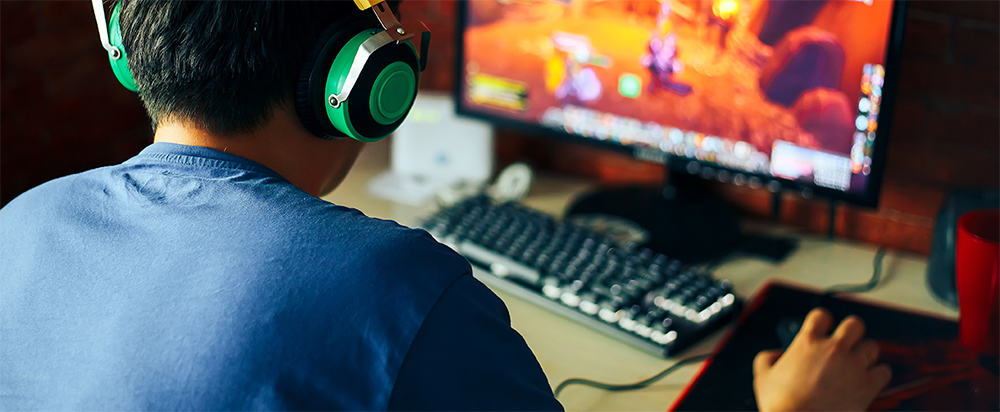
Computer Addiction
We live in an age when nearly every interaction or transaction can be facilitated through an Internet-connected device. The Internet allows you to do anything from catch up with classmates on social media, find a job, pay your bills, and even get mental health therapy online! There is no doubting that the Internet, digital devices, apps, and other technology can be used for good in our lives. But like anything, not using the Internet in moderation has negative consequences in people’s lives.
What is Computer Addiction?
“If your young adult child’s Internet or computer usage is so excessive that it causes them to neglect relationships, work, school or other significant life situations, then they may be suffering from this condition. “
Internet addiction disorder goes by many names (i.e. computer addiction, Internet addiction, or online addiction) but its meaning is relatively straightforward: an impulse control-disorder marked by an unhealthy obsession with texting, playing games, surfing the web, chat rooms, social networking, or any other web-based activity.
As a parent, you may wonder where the line is drawn between unhealthy and healthy Internet usage. If your young adult child’s Internet or computer usage is so excessive that it causes them to neglect relationships, work, school or other significant life situations, then they may be suffering from this condition.

“Hang on. Let me Google that.”
Have you ever wondered why the urge to look up the name of that one actress is so compelling? You know the feeling. It feels worth taking a break from anything you’re doing–spending time with family and friends, worshipping at a church service, sitting through a work meeting or class lecture. The urge builds until you finally pull out your phone and find the answer to your question. Happy and satisfied, you’re able to be present once again.
“The dopamine makes you feel good, so you want to do it more.”
The answer to this is more than just curiosity. It’s dopamine. Dopamine is a reward chemical in our brain that’s released when you exercise (like that “runner’s high” you’ve heard of or experienced), when you eat your favorite food, or when you accomplish something. To your brain, answering that question is a tiny little accomplishment, and thus, you get dopamine. It’s the same chemical that encourages us to be productive, and the same chemical that’s often responsible for drug addiction. The dopamine makes you feel good, so you want to do it more. This encourages people to increase time spent on Internet-capable devices and mimic addictive behaviors, where you feel like the urges control you, instead of the other way around.
An Easy Escape from Hard Things
You’ve probably heard the phrase, maybe directly from your young adult, that “adulting is hard” or “I can’t adult today”. The transition into young adulthood brings with it many new responsibilities, some of which are overwhelming for young adults. Cell phones, tablets, and laptops make it easy to escape any problem. If only momentarily, checking social media, texting friends, or playing games can distract your young adult from uncomfortable situations like sitting through a boring lecture or being in a room full of unknown people.
“Your child might not know how to have a face-to-face conversation and be fully present with people they’re with.”
As teens and young adults get into the habit of distracting themselves when uncomfortable situations arise, you can guess that the long-term effects are going to be challenging. Time spent using technology decreases their time spent on age-appropriate tasks. You may have noticed that your child doesn’t spend much time with friends, and when their friends are together, they all have their phones out. Your child might not know how to have a face-to-face conversation and be fully present with the people around them. They might have a hard time focusing on work, school, or driving because of the constant urge to check their smartphone, social media, or other Internet-based activities.
The addictive behaviors of compulsively checking their smartphone each time it dings-and even when it doesn’t-can also contribute to a reduced sense of well-being. The need to be constantly tuned in to what’s happening on their cell phone or other device can cause anxiety and stress from never being “off” or having down time.

Gaming Addiction
One of the most talked about forms of Internet addiction is gaming addiction. Whether playing games on a phone, computer, or Internet-connected TV, gaming addiction can take over a young adult’s life. Online role-playing games, where a person assumes the role of a fictitious character, are often the most addictive.
Players are usually able to communicate with other players through the Internet, which can give addicted players a sense of community and socialization. If your young adult child has struggled socially in the past, being able to join a community of gamers with shared interests can give them the sense of belonging they’ve been looking for.
“Professionals are taking excessive gaming, Internet, and technology addiction as a serious mental health issue.”
Gaming addiction, also called Internet gaming disorder or Internet gaming addiction, is listed in the 2013 edition of the diagnostic and statistical manual (DSM-V) as a mental health “condition for further study”. Professionals are taking excessive gaming, Internet, and technology addiction as a serious mental health issue.
What kind of treatment is available?
“If technology addiction is having a severe impact on daily function, or your young adult also struggles with a co-occuring mental health disorder, you may find the best help from residential treatment centers”
Your options for treating computer addiction/screen addiction, Internet addiction, or gaming addictions depend on the needs of your family. You might choose to try outpatient treatment first, where your child will attend therapy once or twice a week. This is your best option if technology use is somewhat problematic and your young adult is not experiencing co-occurring disorders such as severe depression or anxiety, substance abuse, a personality disorder, post-traumatic stress, or other mental health disorders. Outpatient therapy can help with coping skills, goal setting, and accountability, as well as processing underlying issues that have led to addictive behaviors.
If technology addiction is having a severe impact on daily function, or your young adult also struggles with a co-occuring mental health disorder, you may find the best help from residential treatment centers. In a residential treatment program, your child will live away for a time while deeply emerged in the healing process. Residential treatment centers give teens and young adults the opportunity to work through difficult struggles while in a safe, supportive, supervised environment.
If you need help deciding what level of care is right for your family, consider working with an educational consultant. They will help you evaluate your needs and goals and identify programs that will be the best fit for your child and family.
How Can OPI Help My Young Adult Overcome Computer Addiction?
“We believe that learning to use technology in productive, balanced ways is crucial to success in a world that uses computer-based tools and the Internet as an important part of education and the workforce.”
Our treatment program focuses on helping your child overcome mental health issues that are holding them back, as well as gaining the life skills and experiences that will help them move forward.
At OPI, participants are allowed to have their smartphone, laptop, and other devices from day one. We will only ask them to surrender their devices if they show us that they’re not able to use them appropriately. We believe that learning to use technology in productive, balanced ways is crucial to success in a world that uses computer-based tools and the Internet as an important part of education and the workforce. Your young adult will work in individual therapy, group therapy, and with their life coach on finding this balance. We will also help your child work through co-occurring disorders such as depression, anxiety, personality disorders, family problems, and other mental health issues.
To prepare your young adult for independence, participants in the OPI treatment program live in luxury apartments in the heart of southern California. With the help of their life coach, they learn how to maintain their apartment and get along with their roommates. All participants will also find a job, attend school, or be involved in volunteer service. They learn how to balance their mental health and self-care (therapy and OPI activities) with the life of a young adult (college classes, a job, and living on their own). With this practice, your child will not only heal from computer addiction, but leave OPI prepared to engage fully in their future.
Does your young adult need help balancing technology use?
Call us now at 866.661.3982 to talk about the help your child needs or fill out the form below.
